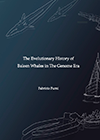PhD defence Fabricio Garcia Furni
| When: | Mo 27-05-2024 at 14:30 |
| Where: | Academy Building & online |
Fabricio Garcia Furni (Marine Biology)
Promotores: Prof. P.J. Palsboll, Prof. C. Speller (University of British Columbia, Canada), Prof. E. Secchi (Universidade Federal do Rio Grande, Brazil)

The evolutionary history of baleen whales in the genome era
Humans have been changing landscapes and biodiversity at a global scale to supply the needs of an exponentially growing population. The rapid development and deployment of technology enabled humans to explore natural resources in an unprecedented manner. As the human population increased, reductions in wild populations followed. How long can exploited populations sustain humans? Will populations that recovered from a substantial reduction thrive? What can history teach us about how to maintain biodiversity? At the same time, technology has revolutionized science in many ways. A good example is genomics. Now we are able to obtain complete genome data of organisms at unprecedented scales, times, and costs. The hidden information coded in billions of DNA nucleotides is an excellent means to access the past, understand the present, and project the future. An interesting animal group to investigate the above questions is baleen whales. Their enigmatic underwater life, complex evolutionary histories, drastic past population reductions during commercial whaling, and recent recovery, provide a unique opportunity to empirically assess some commonly held assumptions in population genetics theory and make predictions concerning the genomic legacy in contemporary populations.
This thesis explores the information contained in the complete genomes of baleen whales, the largest vertebrates on Earth. Employing cutting-edge analyses of the genome era, I attempted an in-depth investigation of the long-term and recent evolutionary past of baleen whales. This thesis offers insight into some baleen whales' complex phylogenetic relationships, a genome-wide glimpse into current and past genetic diversity, changes in mutations, and most notably, the impact of human exploitation on the genomic legacy of baleen whales.
